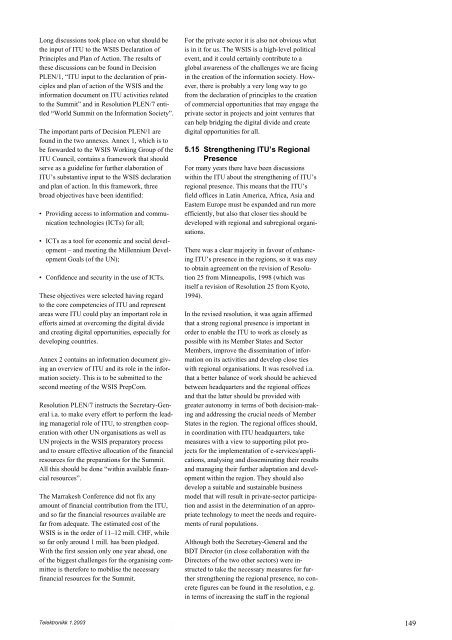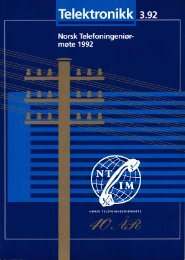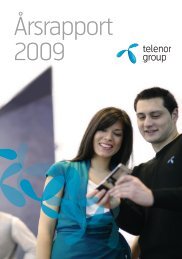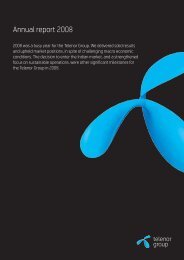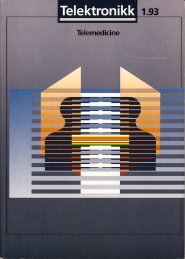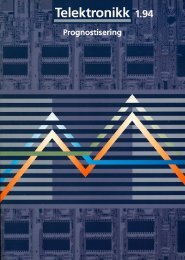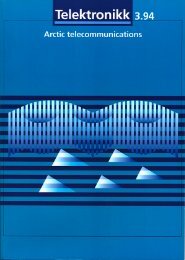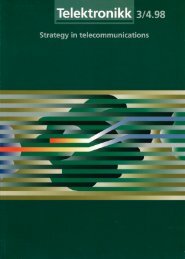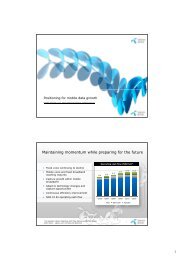Intelligent Transport Systems - Telenor
Intelligent Transport Systems - Telenor
Intelligent Transport Systems - Telenor
You also want an ePaper? Increase the reach of your titles
YUMPU automatically turns print PDFs into web optimized ePapers that Google loves.
Long discussions took place on what should be<br />
the input of ITU to the WSIS Declaration of<br />
Principles and Plan of Action. The results of<br />
these discussions can be found in Decision<br />
PLEN/1, “ITU input to the declaration of principles<br />
and plan of action of the WSIS and the<br />
information document on ITU activities related<br />
to the Summit” and in Resolution PLEN/7 entitled<br />
“World Summit on the Information Society”.<br />
The important parts of Decision PLEN/1 are<br />
found in the two annexes. Annex 1, which is to<br />
be forwarded to the WSIS Working Group of the<br />
ITU Council, contains a framework that should<br />
serve as a guideline for further elaboration of<br />
ITU’s substantive input to the WSIS declaration<br />
and plan of action. In this framework, three<br />
broad objectives have been identified:<br />
• Providing access to information and communication<br />
technologies (ICTs) for all;<br />
• ICTs as a tool for economic and social development<br />
– and meeting the Millennium Development<br />
Goals (of the UN);<br />
• Confidence and security in the use of ICTs.<br />
These objectives were selected having regard<br />
to the core competencies of ITU and represent<br />
areas were ITU could play an important role in<br />
efforts aimed at overcoming the digital divide<br />
and creating digital opportunities, especially for<br />
developing countries.<br />
Annex 2 contains an information document giving<br />
an overview of ITU and its role in the information<br />
society. This is to be submitted to the<br />
second meeting of the WSIS PrepCom.<br />
Resolution PLEN/7 instructs the Secretary-General<br />
i.a. to make every effort to perform the leading<br />
managerial role of ITU, to strengthen cooperation<br />
with other UN organisations as well as<br />
UN projects in the WSIS preparatory process<br />
and to ensure effective allocation of the financial<br />
resources for the preparations for the Summit.<br />
All this should be done “within available financial<br />
resources”.<br />
The Marrakesh Conference did not fix any<br />
amount of financial contribution from the ITU,<br />
and so far the financial resources available are<br />
far from adequate. The estimated cost of the<br />
WSIS is in the order of 11–12 mill. CHF, while<br />
so far only around 1 mill. has been pledged.<br />
With the first session only one year ahead, one<br />
of the biggest challenges for the organising committee<br />
is therefore to mobilise the necessary<br />
financial resources for the Summit.<br />
Telektronikk 1.2003<br />
For the private sector it is also not obvious what<br />
is in it for us. The WSIS is a high-level political<br />
event, and it could certainly contribute to a<br />
global awareness of the challenges we are facing<br />
in the creation of the information society. However,<br />
there is probably a very long way to go<br />
from the declaration of principles to the creation<br />
of commercial opportunities that may engage the<br />
private sector in projects and joint ventures that<br />
can help bridging the digital divide and create<br />
digital opportunities for all.<br />
5.15 Strengthening ITU’s Regional<br />
Presence<br />
For many years there have been discussions<br />
within the ITU about the strengthening of ITU’s<br />
regional presence. This means that the ITU’s<br />
field offices in Latin America, Africa, Asia and<br />
Eastern Europe must be expanded and run more<br />
efficiently, but also that closer ties should be<br />
developed with regional and subregional organisations.<br />
There was a clear majority in favour of enhancing<br />
ITU’s presence in the regions, so it was easy<br />
to obtain agreement on the revision of Resolution<br />
25 from Minneapolis, 1998 (which was<br />
itself a revision of Resolution 25 from Kyoto,<br />
1994).<br />
In the revised resolution, it was again affirmed<br />
that a strong regional presence is important in<br />
order to enable the ITU to work as closely as<br />
possible with its Member States and Sector<br />
Members, improve the dissemination of information<br />
on its activities and develop close ties<br />
with regional organisations. It was resolved i.a.<br />
that a better balance of work should be achieved<br />
between headquarters and the regional offices<br />
and that the latter should be provided with<br />
greater autonomy in terms of both decision-making<br />
and addressing the crucial needs of Member<br />
States in the region. The regional offices should,<br />
in coordination with ITU headquarters, take<br />
measures with a view to supporting pilot projects<br />
for the implementation of e-services/applications,<br />
analysing and disseminating their results<br />
and managing their further adaptation and development<br />
within the region. They should also<br />
develop a suitable and sustainable business<br />
model that will result in private-sector participation<br />
and assist in the determination of an appropriate<br />
technology to meet the needs and requirements<br />
of rural populations.<br />
Although both the Secretary-General and the<br />
BDT Director (in close collaboration with the<br />
Directors of the two other sectors) were instructed<br />
to take the necessary measures for further<br />
strengthening the regional presence, no concrete<br />
figures can be found in the resolution, e.g.<br />
in terms of increasing the staff in the regional<br />
149


